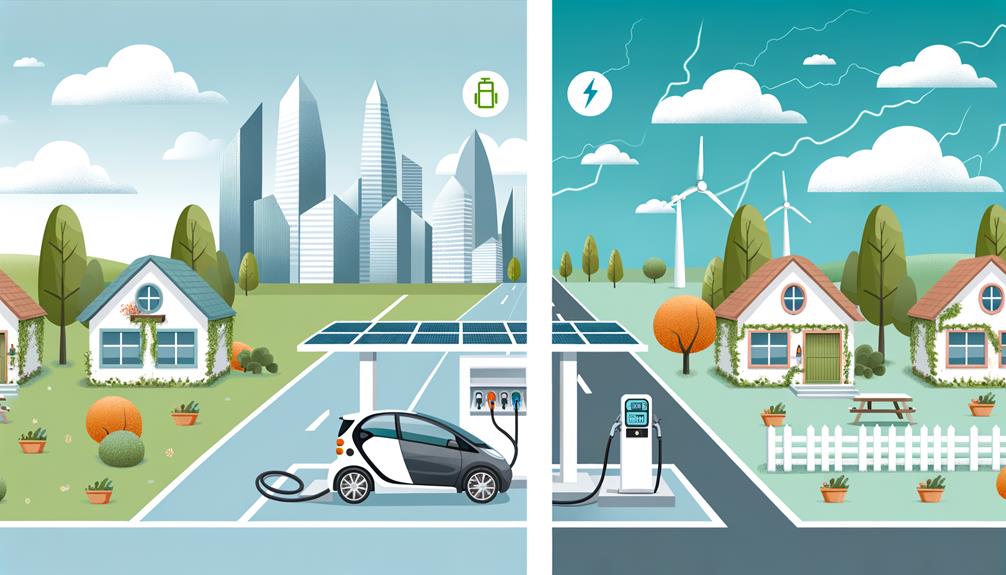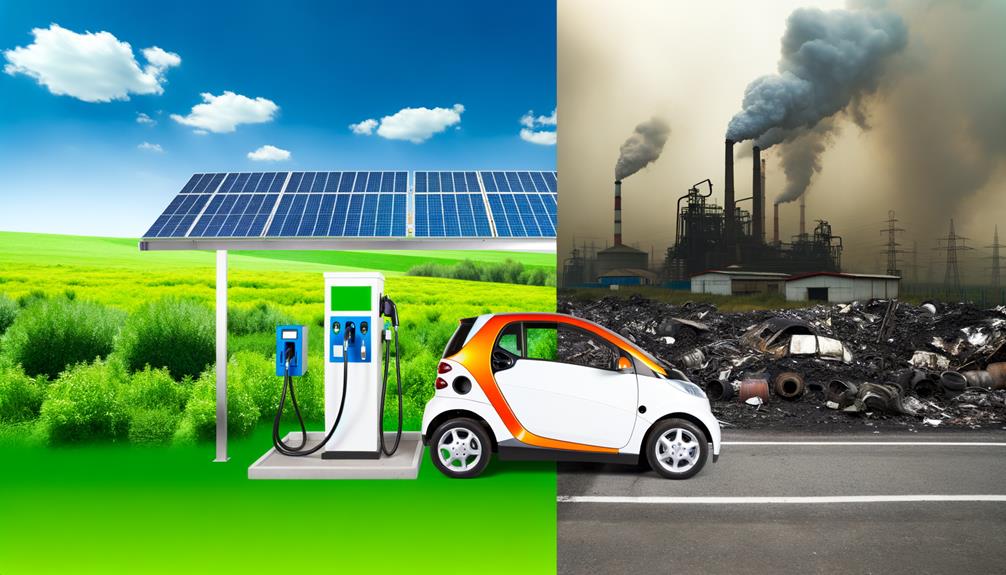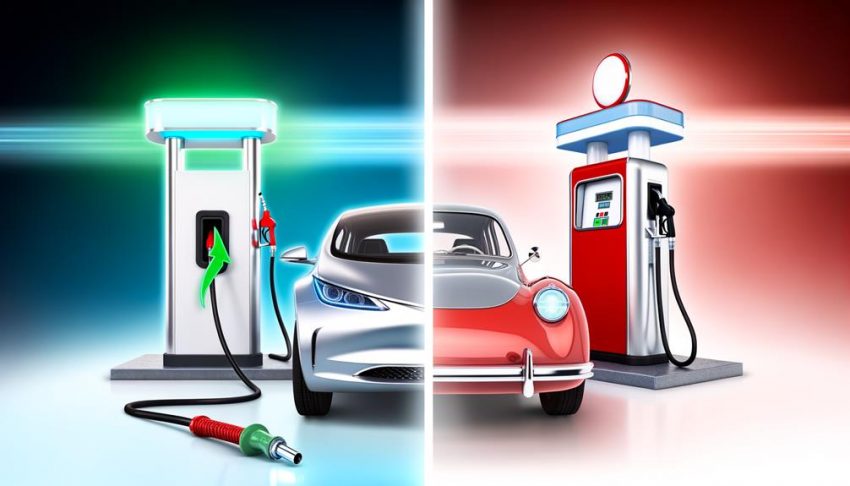When weighing whether charging an electric car is cheaper than fueling a gasoline vehicle, you can't ignore the potential financial benefits. On average, the cost to charge an electric vehicle is about 5 cents per mile, in stark contrast to around 15 cents per mile for gasoline cars. This translates to considerable annual savings for EV owners. But how do these costs vary by state, and what about the overall impact on ownership and efficiency? The question isn't just about immediate savings but also the broader implications on your wallet and the environment. Curious to learn more? Let's explore further.
Contents
Understanding EV Charging Costs
Understanding the nuances of EV charging costs can seem intimidating, but it's essential for anyone considering an electric vehicle. One of the biggest advantages of owning an electric vehicle (EV) is the potential savings on fueling costs. On average, electricity prices in the U.S. hover around 16 cents per kWh, translating to an EV charging cost of roughly 5 cents per mile for standard electric vehicles. This is remarkably lower than the cost of gasoline.
Charging at home is typically more economical than using public charging stations. On average, home charging costs about $56 per month, whereas fueling a gasoline vehicle for the same distance could set you back around $182.50. For example, the Tesla Model 3, which consumes about 0.220 kWh per mile, offers a remarkably low charging cost of approximately 3.52 cents per mile. This is a stark contrast to the per-mile cost when using gasoline.
However, regional variations in electricity prices can greatly impact your EV charging costs. States like Idaho, with rates as low as 11.55 cents/kWh, make charging an EV more affordable compared to higher-cost states like California, where prices can reach 29.41 cents/kWh. Additionally, taking advantage of time-of-use rates, where electricity is cheaper during off-peak hours, can further reduce your expenses. Charging your EV at night, for instance, can lead to substantial savings.
Electricity Costs by State
Maneuvering the landscape of electricity costs by state can reveal significant insights for prospective EV owners. In 2023, the average electricity cost in the U.S. stands at roughly 16 cents per kWh. This average, however, masks substantial regional differences that can greatly affect your charging costs. For instance, Idaho boasts some of the lowest rates at 11.55 cents per kWh, translating to an estimated 3.6 cents per mile for charging an EV. On the flip side, California's electricity cost is among the highest at 29.41 cents per kWh, resulting in a charging expense of approximately 9 cents per mile.
These state electricity rates mean that where you live plays a vital role in determining your overall charging expenses. States in the Northeast and West generally experience higher electricity costs, which can make EV charging stations in these regions more expensive to use. Conversely, states with lower electricity rates like those in the Midwest and South offer more economical options for EV owners.
It's also worth noting that electricity costs aren't static. Seasonal and monthly fluctuations can further impact your charging costs. For example, during peak summer months, electricity rates can spike due to higher demand, thereby increasing your overall expenses.
Understanding these regional differences in electricity pricing helps you make more informed decisions about EV ownership. Whether you're considering the low Idaho electricity rates or bracing for the higher California electricity cost, knowing the intricacies of state electricity rates can help you better manage your EV charging expenses and optimize your budget.
Ownership and Efficiency Comparison

Steering through the domain of vehicle ownership costs, one can't overlook the financial advantages of electric vehicles (EVs) over gasoline-powered cars. The difference in charging costs versus fueling costs is stark, with EVs costing about $0.05 per mile compared to $0.13 per mile for gasoline vehicles. This translates to an average annual fueling cost of $485 for an EV, while a gas vehicle sets you back around $1,117. That's a whopping 60% savings on fuel for EV owners.
But it doesn't stop at fueling costs. EVs also boast lower maintenance costs. They average about $300 annually, compared to the $1,200 you'd spend on a gasoline vehicle. Why? EVs have fewer moving parts and don't require frequent servicing like oil changes. Over the lifespan of a vehicle, these savings add up, reducing the total cost of ownership by a hefty $7,000 to $11,000.
To make it more relatable, consider these points:
- Fueling Costs: EVs save you money at the pump—or rather, by avoiding the pump altogether.
- Maintenance Costs: Less frequent servicing means lower yearly expenses and fewer surprises.
- Energy Conversion: EVs convert over 77% of electrical energy into power at the wheels, whereas gas vehicles achieve only 12% to 30%.
When you look at the overall financial picture, the savings and efficiency of EVs are hard to overlook. From lower charging costs and average annual fueling costs to reduced maintenance costs, the total cost of ownership for an EV proves to be a more economical choice. Plus, the high charging efficiency guarantees you're getting more bang for your buck.
Charging Vs. Gasoline Prices
Peeling back the layers of vehicle operating costs, it's clear that charging an electric vehicle (EV) is markedly cheaper than fueling a gasoline-powered car. When comparing charging costs vs gasoline prices, the difference is considerable. The average cost to charge an EV is around $67 per month, while gasoline costs can reach $182.50 for the same 1,250 miles driven. This stark contrast highlights how much cheaper it is to fill an EV compared to a traditional car.
Annually, the savings become even more evident. EV owners typically save about $1,390 on fueling costs each year. The yearly cost to keep an EV running is approximately $799.92, in contrast to $2,190 for gasoline cars. It's clear that the cost to charge an EV, about 5 cents per mile, is considerably lower than the 15 cents per mile spent on gasoline. This discrepancy underscores the financial benefits of EV ownership.
Additionally, the stability of electricity rates plays a vital role. In 2023, the average gas price in the U.S. was $3.52 per gallon, while electricity costed about 16 cents per kWh. Despite regional variations in electricity prices, charging an EV remains cheaper across all 50 states. Even in areas with higher electricity rates, the cost per mile to charge an EV is still more economical than gasoline.
Environmental and Infrastructure Impact

When you take into account the environmental and infrastructure impact of electric vehicles (EVs), the benefits become quite clear. EVs produce zero tailpipe emissions, which means they don't contribute to air pollution like gasoline vehicles do. This reduction in harmful greenhouse gases is a notable step toward combating climate change. By shifting to EVs, you're not just cutting down on air pollution but also reducing reliance on fossil fuels. Charging your EV with renewable energy sources like solar or wind power can further minimize your environmental impact.
Moreover, the charging infrastructure in the U.S. is rapidly expanding. With over 100,000 public charging stations available, it's becoming increasingly convenient to charge your EV wherever you are. This growing network of Level 2 and Level 3 chargers supports the broader adoption of EVs by providing faster and more efficient charging options for users on the go.
Here are some compelling points to ponder:
- Zero Tailpipe Emissions: EVs help reduce air pollution, which is better for public health and the environment.
- Decreased Reliance on Fossil Fuels: Using renewable energy to charge EVs makes a considerable difference in lowering your carbon footprint.
- Expanding Charging Infrastructure: The availability of numerous public charging stations makes owning an EV more practical and convenient.
Studies have shown that the overall carbon footprint of EVs is considerably lower than that of traditional gasoline vehicles, even when accounting for the environmental impact of battery production. As charging infrastructure continues to develop, EV adoption will likely accelerate, leading to even greater environmental benefits. By choosing an electric vehicle, you're contributing to a cleaner, more sustainable future.
Frequently Asked Questions
Is It Cheaper to Charge Your Car at Home or at a Station?
Home charging's generally cheaper due to lower energy rates and greater charging efficiency. Public charging's convenience factor can't be ignored, but higher costs, variable rates, and potential fees add up. Installation costs for a home setup are offset over time.
How Much Does It Actually Cost to Charge an Electric Car?
Charging efficiency and electricity rates greatly affect costs. A full charge's price depends on your EV's battery capacity and charging time. Home installation reduces maintenance costs and grid impact, enhancing environmental benefits and alleviating range anxiety.
How Much Does It Cost to Charge an Electric Car at a Fast Charging Station?
At a fast charging station, costs range from $10 to $30 per session. Factors like charging speed, station availability, network, payment methods, pricing models, energy source, location impact, and charging time all influence user experience and environmental benefits.
What Are the Disadvantages of Electric Vehicles?
You're facing range anxiety, battery degradation, limited charging infrastructure, and a high initial investment. Maintenance costs, resale value, environmental impact, performance limitations, charging time, and frequent technology updates also pose significant challenges for electric vehicle ownership.
Conclusion
To sum up, charging an electric car is not just cheaper but also offers significant long-term savings compared to gasoline vehicles. You'll spend about a third less per mile and save thousands over the EV's lifespan. With varying electricity costs by state and the added environmental benefits, choosing an EV is both a smart financial and eco-friendly decision. The numbers don't lie—going electric is a win for your wallet and the planet.
